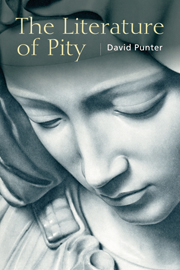Book contents
- Frontmatter
- Contents
- Plates
- Preface
- Acknowledgements
- 1 Distinguishing Pity
- 2 Pity and Terror: The Aristotelian Framework
- 3 Pietà
- 4 Shakespeare on Pity
- 5 The Eighteenth Century
- 6 Blake: ‘Pity would be no more …’
- 7 Aspects of Victoriana
- 8 Chekhov and Brecht: Pity and Self-Pity
- 9 ‘War, and the pity of War’: Wilfred Owen, David Jones, Primo Levi
- 10 Reflections on Algernon Blackwood's Gothic
- 11 Pity's Cold Extremities: Jean Rhys and Stevie Smith
- 12 Reclaiming the Savage Night
- 13 ‘Pity the Poor Immigrant’: Pity, Diaspora, the Colony
- 14 Lyric and Pity
- After Thought: Under the Dome
- Notes
- Bibliography
- Index
6 - Blake: ‘Pity would be no more …’
Published online by Cambridge University Press: 05 September 2014
- Frontmatter
- Contents
- Plates
- Preface
- Acknowledgements
- 1 Distinguishing Pity
- 2 Pity and Terror: The Aristotelian Framework
- 3 Pietà
- 4 Shakespeare on Pity
- 5 The Eighteenth Century
- 6 Blake: ‘Pity would be no more …’
- 7 Aspects of Victoriana
- 8 Chekhov and Brecht: Pity and Self-Pity
- 9 ‘War, and the pity of War’: Wilfred Owen, David Jones, Primo Levi
- 10 Reflections on Algernon Blackwood's Gothic
- 11 Pity's Cold Extremities: Jean Rhys and Stevie Smith
- 12 Reclaiming the Savage Night
- 13 ‘Pity the Poor Immigrant’: Pity, Diaspora, the Colony
- 14 Lyric and Pity
- After Thought: Under the Dome
- Notes
- Bibliography
- Index
Summary
Pity; the weak; the strong. When thinking of Blake's emblematic writings on pity, it would be impossible to begin anywhere other than with the two remarkable poems in the Songs of Innocence and of Experience which deal with pity in perhaps the most sustained, certainly the most memorable way: ‘The Divine Image’ from Songs of Innocence (1789) and ‘The Human Abstract’ from Songs of Experience (1789–94). Here is ‘The Divine Image’:
To Mercy, Pity, Peace, and Love
All pray in their distress;
And to these virtues of delight
Return their thankfulness.
For Mercy, Pity, Peace, and Love
Is God, our father dear,
And Mercy, Pity, Peace, and Love
Is Man, his child and care.
For Mercy has a human heart,
Pity a human face,
And Love, the human form divine,
And Peace, the human dress.
Then every man, of every clime,
That prays in his distress,
Prays in the human form divine,
Love, Mercy, Pity, Peace.
And all must love the human form,
In heathen, turk, or jew;
Where Mercy, Love, & Pity dwell
There God is dwelling too.
And here, in a poetic highly redolent of the contemporary hymns by which he was so ambiguously influenced, Blake establishes pity as an essential element in the continuous transaction between the divine and the human that was the continuing basis of his theology. There is little here that is troublesome: pity, as a trait (one might even say as an abstract concept, but that would be confusing) is un-ironic, it is a quality which manifests itself as an attribute of our dealings with other people and thus necessarily with God. If there is a discordant tone struck by this poem, one which may take it momentarily beyond the kind of song that might be sung by Sunday-school children – albeit on Holy Thursday perhaps – it occurs only in the last stanza, where the potentially divisive question of belief and conversion is blandly and skilfully elided into a broader view of tolerance.
- Type
- Chapter
- Information
- The Literature of Pity , pp. 59 - 71Publisher: Edinburgh University PressPrint publication year: 2014



